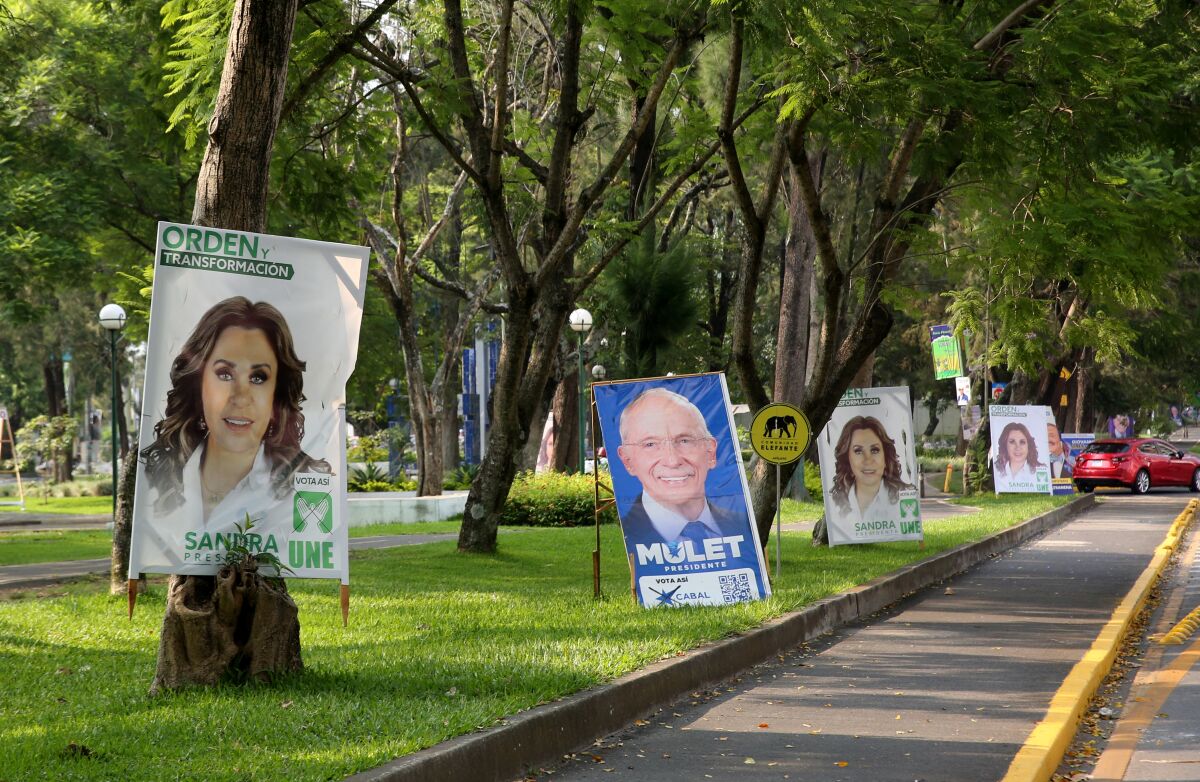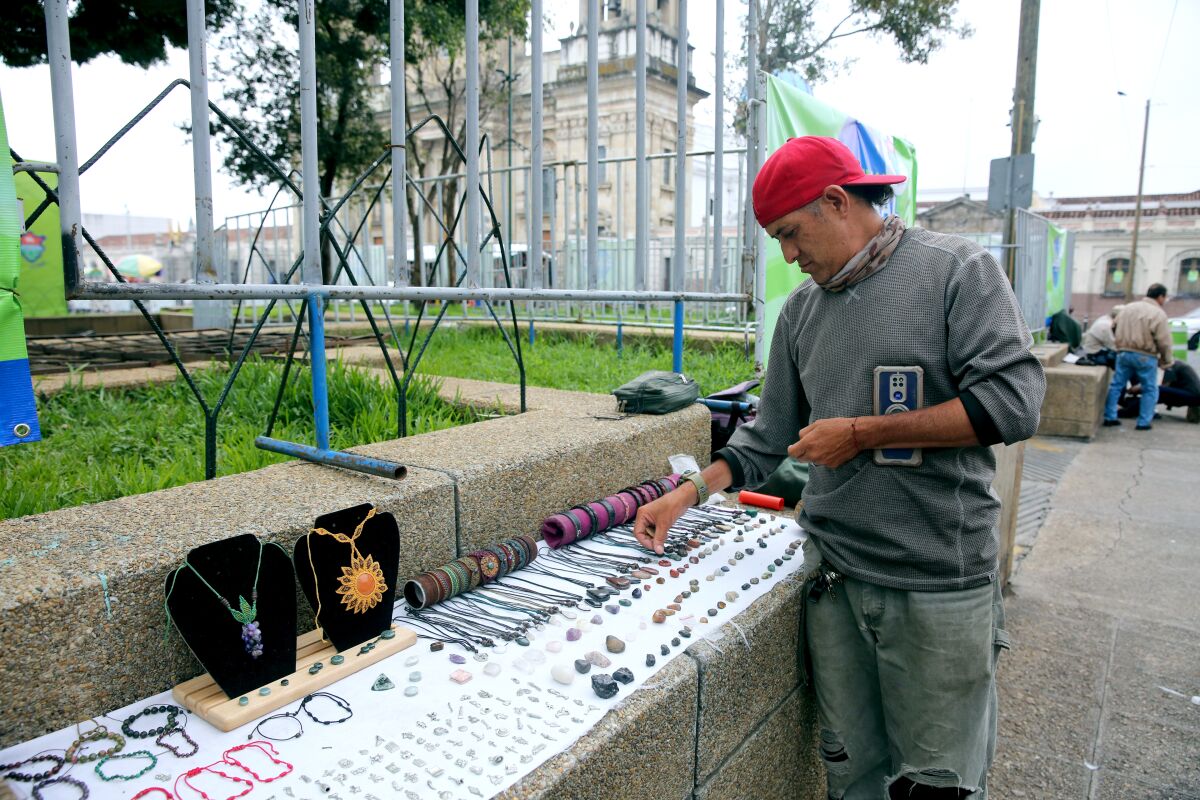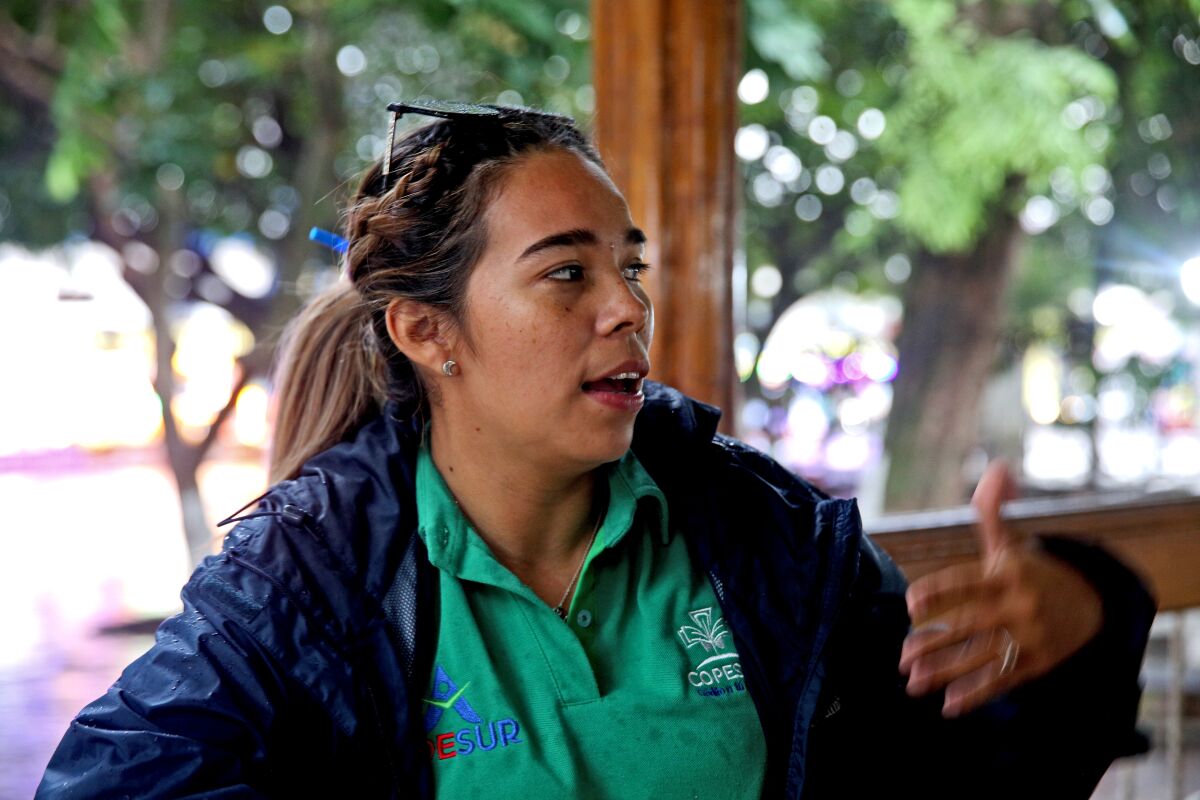The clock reads 11:50 a.m., and Luis Bian is greeting pedestrians with a huge smile that belies his personal financial plight and his anxieties about Guatemala’s looming presidential election.
With a camera strung from his neck, Bian solicits customers to photograph in front of this Central American capital’s Metropolitan Cathedral of Santiago de Guatemala. Before COVID struck, he sold up to 40 photos a day for 15 or 20 quetzales apiece, roughly $2.50. Now the 60-year-old is doing well if he sells 10 photos. He’s struggling to survive, sometimes passing an entire day without food.
Street photographer Luis Bian, waiting for customers in the historic core of Guatemala City, Guatemala, on May 30, said that whoever wins Sunday’s presidential election, it won’t make much difference in resolving the nation’s chronic problems.
(Raul Roa / Los Angeles Times)
Asked whom he plans to cast his ballot for in Sunday’s presidential contest, which also will determine 160 members of Guatemala’s congress, 20 members of the Central American Parliament and 340 mayors, Bian responds with a refrain common among voters here: Whoever wins, it won’t make much difference in resolving the nation’s chronic problems.
“It’s the same refrain as always,” he says of politicians, in a tone of serene resignation. “They need a little more conscience and humility. You can see that they compete more than anything for power. We’re a long way off from anyone wanting to, or being able to, get us out of this crisis.”
As voting day approaches in Guatemala, the leading candidates have stepped up their verbal attacks on one another and the principal streets of the capital are crammed with campaign posters of the 22 presidential contenders. But many of Guatemala’s 9.3 million registered voters still appear unsure who they’ll vote for.
Among them are some of the 89,554 Guatemalan immigrants living in the United States, who will be able to vote for president for the second time since stateside expatriates received the franchise in 2019 (though some have denounced the voting process as marred by incompetence and political favoritism). Their uncertainty partly stems from the sheer number of candidates. In addition, some voters refuse to support any candidate from one of the traditional political parties or with ties to current President Alejandro Giammattei, who has been shadowed by allegations of corruption and undermining free speech and judicial independence.
“We need to see an active citizenry, so that the democratic deterioration is not allowed to continue, but rather that whoever comes [to power] can commit to restoring democratic values that have been quite eroded in recent years,” said Carolina Jiménez, president of the Washington Office on Latin America, which advocates for human rights in the region. “We are facing an authoritarian drift.”
Within the large field of presidential candidates, a handful of front-runners have emerged. Two polls earlier this year showed right-wing candidate Carlos Pineda in first place, but Pineda was barred from the race on May 26 by the Constitutional Court over alleged violations of electoral law.
The leading candidate now appears to be former First Lady Sandra Torres, followed by diplomat and lawyer Edmond Mulet and Zury Ríos, a right-wing candidate who is the daughter of Gen. Efraín Ríos Montt, who was sentenced to 80 years in prison for massacres in Ixil villages that killed more than 1,770 people during Guatemala’s ruinous and genocidal civil war of 1960-96.

Campaign posters for Guatemalan presidential candidates line Avenida La Reforma in Guatemala City.
(Raul Roa / Los Angeles Times)
Anita Isaacs, a political scientist at Haverford College, said Guatemala’s political establishment has been banking on Ríos’ candidacy. She said that Ríos is a key player because since 2015 Guatemala’s political ruling class has been “rebuilding the corrupt and anti-democratic atate” after the United Nations-backed International Commission against Impunity in Guatemala, known as CICIG, imprisoned former President Otto Pérez Molina for corruption. CICIG was shut down in 2019 by then-President Jimmy Morales, who claimed the commission had impeded the nation’s sovereignty. Critics saw CICIG’s closure as a serious blow to the rule of law and the fight against corruption.
Pineda was the third candidate to be blocked from the presidential race. Roberto Arzú, of the right-wing Podemos party, and Thelma Cabrera, a candidate for the leftist Movement for the Liberation of the Peoples, also were excluded by courts. All three are urging a null vote on the presidential ballot, a call that is resonating with some voters who intend to cast ballots only for congress and other offices.
“I will only vote for representatives, that is really where the decision making is,” said street vendor Juan Rodas, 44, as he offered customers bracelets and necklaces made of jasper, obsidian and jade stones in front of the National Palace.

Street vendor Juan Rodas displays his homemade necklaces and other wares in Guatemala City. Rodas is among disaffected Guatemalan voters who intend to skip the presidential race and cast ballots only for congress and other offices.
(Raul Roa / Los Angeles Times)
“Regardless of who is left, I look at the country the same way,” he continued. “The water and electricity bills arrive on time, I have to keep working. In my life I do not see a change.”
Despite the pandemic, the Guatemalan economy has remained stable, authorities and experts say. According to the Ministry of Economy, in 2021 GDP grew 8%, its best performance in 40 years. Hugo Maul, president of the National Economic Research Center, said that national inflation has begun to drop, while the fiscal deficit and public debt are relatively controlled.
However, he said, much of Guatemala’s employment still is concentrated in the informal economy, rather than in relatively stable and well-paid jobs, and the country depends heavily on remittances sent by Guatemalans working in foreign countries. The last official estimate, in 2014, was that 55.4% of Guatemalans live below the poverty line. In areas like western Guatemala, where coconut, corn and banana plantations stretch along the highway, many people scrape by at a barely subsistence level.

A woman and two children stand near a home built of mud bricks and clay tiles roof with political posters on the front wall in Caserio Loma Linda, Guatemala, on June 1.
(Raul Roa / Los Angeles Times)
Among them is Don Augusto Maldonado, 72, a former cattle ranch worker and brush cutter who lives in the village of La Soledad in the province of Suchitepéquez with his 68-year-old wife, Ubalda Castellanos.
“Only thanks to the Creator of heaven is it that we eat some tortillas with my wife,” said Maldonado, a graying man of medium height and dark complexion. His house, covered with old pieces of galvanized sheeting, has no electricity because he can’t afford it.
“This government has let the people down,” said Maldonado, who earns a few quetzales selling firewood, iguanas and hammocks and nets that he weaves. “On the farms they cut down the older people, and they only want patojos to work,” he said, using an expression for young people.
For the new government, Don Agusto has only one request: “I would hope that they would help us as elderly people, because we can no longer earn a living in one way or another.”
Guatemala’s deteriorating security and public safety also preoccupy voters.
“Here, day after day, extortion is seen,” said Bianka Muñoz, 30, a teacher and single mother who was deported back to Guatemala after desperation led her to journey illegally into the United States in 2021. She believes that Guatemala needs harsher legal measures to deal with powerful multinational criminal gangs, but hasn’t decided whom to back for president.

Bianka Muñoz, 30, a teacher and single mother in Mazatenango, Guatemala, believes the country needs harsher legal measures to deal with powerful multinational criminal gangs.
(Raul Roa / Los Angeles Times)
“Sometimes we citizens choose the least worst, and he is the one who ends up damaging Guatemala,” she said. “There is the example of the current president.”
Some presidential candidates, such as Amílcar Rivera and Zury Ríos, sympathize with widespread crackdowns on alleged criminals such as those implemented by President Nayib Bukele of El Salvador, which have been heavily criticized by human rights groups as indiscriminately broad and denying due process.
“It will not help us to capture 10,000 people if we have 500 innocent people, it would be irreversible and irreparable damage,” said Stu Velasco, criminologist and former deputy director of criminal investigation of the National Civil Police.
Some political analysts say that the political opposition to Guatemala’s establishment parties face innumerable obstacles to gaining power, including internal fissures within left-wing parties that will make it difficult for them to cobble together an alliance that could govern the country.
“The left in the country has a vision of the Cold War and, therefore, a very individualistic and dispersed vision,” said Renzo Rosal, a political scientist and academic at Rafael Landívar University in Guatemala City.
Analysts also say that even if a non-establishment candidate were to win the presidency, she or he still would be forced to negotiate with a congress that is riddled with corruption. Presidential elections require the winner to get more than 50% of the vote, otherwise the two candidates with the most votes will face each other in an August 20 runoff.
“I am afraid that whoever is elected will only consolidate what has already been built,” said Juan Francisco Sandoval, a lawyer and former head of the Special Prosecutor’s Office Against Impunity. Sandoval is one of the more than 50 prosecutors, magistrates, judges and journalists who have had to leave Guatemala in recent years for fear of persecution.
“The question,” Sandoval said, “is what will be the breaking point of the current situation.”
This story originally appeared on LA Times

